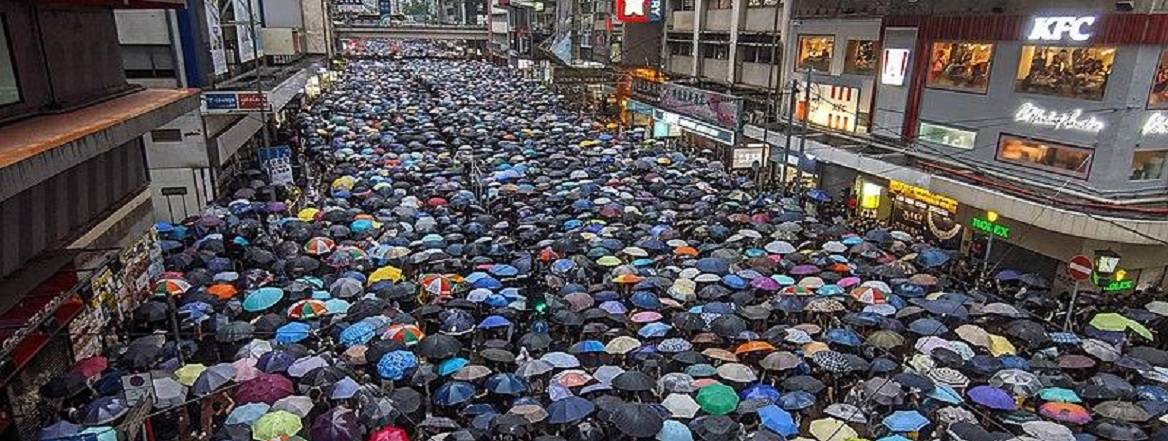Hong Kong After the District Council Elections: Will Anything Change
Hong Kong’s showdown with the central authorities in Beijing continues. And the dilemmas are only getting starker.
Pro-democracy candidates swept the board at the expense of pro-Beijing parties in the district council elections at the end of last month, leading commentators to talk of ‘landslides’ and even ‘tsunamis’. In terms of seats such descriptions are apt. 2015’s large pro-Beijing majority disappeared. Of 452 seats, pro-democrats won 347, independents (many pro-democracy too) 45 and pro-Beijing parties only 60. More than twice the number of voters turned out compared to the previous election, 2.9 million as against 1.4 million, 71 percent of registered voters, a record. This was a clear message to the Chinese Communist Party (CCP) leadership - if it is listening. Despite six months of disruption and violence, support for the protests is holding up. The Hong Kong people will not easily give up their freedoms and values.
But psephology is a dark science. 57% for the pro-democrats is in the range of what they have achieved in past elections to the Legislative Council (Legco), a far more important body than district councils. Given Hong Kong’s convoluted electoral system, pro-democracy candidates are unlikely to win a majority of Legco seats in the September 2020 elections or have a decisive say in the selection of the next Chief Executive (CE), something which really would concern Beijing.
District council elections use a first-past-the-post system, which translated into a massive swing. Half of Legco seats are decided by proportional representation; the other half by restricted ‘functional constituencies’ (finance, tourism, industry, legal and other sectors). The CE is (s)elected by a committee of 1,200, 117 of whom are district councillors. Despite the district council election results pro-Beijing members will still outnumber democrats when it comes to the big decisions.
THE IMPASSE REMAINS
The Chinese for ‘contradiction’ is maodun, after the story of a seller of spears (mao) who boasted that his spear could pierce any defence, while a seller of shields (dun) claimed that his product was impenetrable.
The Mao
On one hand, the CCP is steadfast in its approach to Hong Kong. The CCP’s aim is that by 2047, when the ’50 years without change’ promised to Hong Kong at the handover runs out, the city should be no different from any other on the mainland. That is the logic of the ‘second centennial goal’, that by the 100th anniversary of the founding of the People’s Republic of China the state should be a strong, modernised, harmonious socialist country.
In practice people will not wait until 2047 before deciding whether to accept that fate or leave. The crucial date for people’s decisions could well be 2032, since many land leases are of a 15 year duration and investors need to have certainty about what law will apply after 2047, just as they did in 1982, when the 1997 handover was being negotiated.
Signals from the 4th Plenum of the CCP in October look ominous. General Secretary Xi Jinping appears to be doubling down on his hard approach, with talk about changes to the selection of the CE and top officials; interpretations of Hong Kong’s Basic Law by the National People's Congress Standing committee (worrying for Hong Kong’s rule of law); further integration of Hong Kong into the surrounding Greater Bay Area; introduction of a national security law; and patriotic education of civil servants and the young. Xi likes to portray himself as a strong man in charge of a strong country. His treatment of other peripheral territories – Xinjiang, Tibet and Taiwan – does not suggest a loose rein for Hong Kong.
The Dun
On the other, the elections show that Hong Kong resistance is not flagging after six months. And it has deeper roots than economic and social dissatisfaction which Beijing emphasises as cause and solution in order to minimise the reality of political and values-related discontent. Protests in 2003 against proposals to introduce national security legislation, in 2009-10 against rail links under Chinese control, in 2012 against ‘patriotic education’, 2014’s ‘umbrella’ movement in support of more democratic elections show that the will to defend Hong Kong’s freedoms and way of life is strengthening. Many see this as the last chance to resist the erosion of the ‘One Country, Two Systems’ concept. The underlying truth is that Hong Kong does not trust the CCP and that Xi Jinping’s tightening control and repression reinforce that distrust.
What can the CCP Do?
Hong Kong is still of value to China. Up to 60 or 70% of investment into and out of China goes through Hong Kong. Its stock market is important for raising funds for Chinese companies ($35 billion raised in 2018 compared to $21 billion within China). Shenzhen and Shanghai cannot emerge as comparative financial centres while the capital account is closed and the Chinese yuan not freely convertible. On the mainland, investors still lack trust in the rule of law and remain wary of government interference.
The CCP’ primary concern remains potential threats to its power. It will send in the People’s Armed Police (PAP) if it sees contagion from the protests spreading north. Recently it announced a red line: no harm to national security; no challenge to the central government’s authority and the Basic Law; no use of Hong Kong as a base to undermine China.
Sending in the PAP is the last thing the Party wants. Controlling resistance would be difficult and highly visible. Western sanctions might or might not follow, but an inevitable drop in investment and trade would affect employment and stability within China, the CCP’s greatest worry. The CCP’s monopoly on power is legitimised by economic prosperity, but also by a carefully constructed narrative about restoring territorial integrity. Not only would ‘One Country, Two Systems’ in Hong Kong look bankrupt, but Taiwan’s resolve against unification would be strengthened. Xi’s strong country, strong leader reputation would take a battering and would buttress dissatisfaction with his leadership within top levels of the Party.
The best Xi can hope for is that the Hong Kong government can restore calm. But even if it does, it seems unlikely to last.
What Should the UK DO?
The CCP blames the UK and the US for the troubles. This is for domestic consumption: it can hardly blame itself for undermining trust in ‘One Country, Two Systems’. But UK aims centre on supporting of the Joint Declaration, both because upholding international law is important and because we have a moral duty. We also have considerable commercial, financial and other interests.
The UK handed Hong Kong back in 1997, leaving it with few cards. Nevertheless, the UK should:
- Be more vocal in support of the provisions enshrined in the Joint Declaration, an international treaty lodged at the UN.
- Devote more parliamentary time to Hong Kong. The FCO produces a six-monthly report. This is insufficient. Parliament’s Foreign Affairs Committee should hold an inquiry leading to detailed research and recommendations. This should be taken more seriously by government than it sometimes takes parliamentary committee reports.
- Announce that asylum will be granted if/when necessary.
- Help British National Overseas (BNO) passport holders. Politically, it is unlikely that any UK party will agree to let in the several million Hong Kong people who qualify for a BNO passport. But if the UK is going to move towards a points-based system for immigration, then BNO holders should qualify for more points.
Those who object that the above might harm the ‘Golden Era’ of relations with China should note that if Hong Kong hits the buffers, there will be no ‘Golden Era’.
The interests of China, Hong Kong, and other countries are best served by the preservation of this unusual city. Yet the ‘maodun’ does not look likely to go away. In Greek tragedy a god, deus ex machina, was sometimes swung onto the stage at the end of the play to resolve the seemingly unresolvable. Its only conceivable equivalent today might be a new CCP leadership which itself moved towards democracy and more liberal values. Given the increasing control and repression throughout China that does not seem likely.
Charles Parton is a Senior Associate Fellow at RUSI.
BANNER IMAGE: Courtesy of Studio Incendo/Wikimedia Commons
The views expressed in this Commentary are the author’s, and do not represent those of RUSI or any other institution.
WRITTEN BY
Charles Parton OBE
RUSI Senior Associate Fellow, International Security


